If you spend a decent amount of time on the Internet, it’s hard not to come across Facebook tag groups. Tag groups are Facebook groups with seemingly bizarre names, such as “This post is so relatable I’m going to show it to my therapist”, or “sounds stoned and wholesome but okay”. These group names sound like comments so they can be tagged in the comment sections of relevant posts.
But while they may seem to be all fun and games, over the years, tag groups have emerged as a space for people to have open and safe dialogue about the issues we face as a society. Many tag groups are dedicated to discussing everyday injustices in the patriarchal world that we live in, including mansplaining, emotional abuse, and manipulation of the other genders by men. And with its unevenly enforced hate speech policies, Facebook seems to be cracking down on that.
Videos by VICE
It was in 2019 that Facebook groups first started going private or even secret (where one could only join by invitation), for fear of being reported, or “zucced” for their content. “Zuccing” is when a Facebook group is invaded by bad actors who post porn or other content banned by Facebook, report that content, and, in turn, get the group deleted.
The situation has only worsened over time. Last year, group admins noticed that comments were being removed for violating Facebook’s standard for hate speech for seemingly simply mentioning the word “men”.
“Posts and comments started being removed around October 2020,” Carla Davis*, 26, tells VICE. She is one of the admins of the group “The bar for men is so low it’s a tavern in hades”. Having started in May 2019, the group discusses society’s reactions to men’s actions, wherein they’re put on a pedestal for doing the bare minimum at the expense of others. “At first it was just a few comments, but then it started happening more often. Now content is being removed almost every day.”
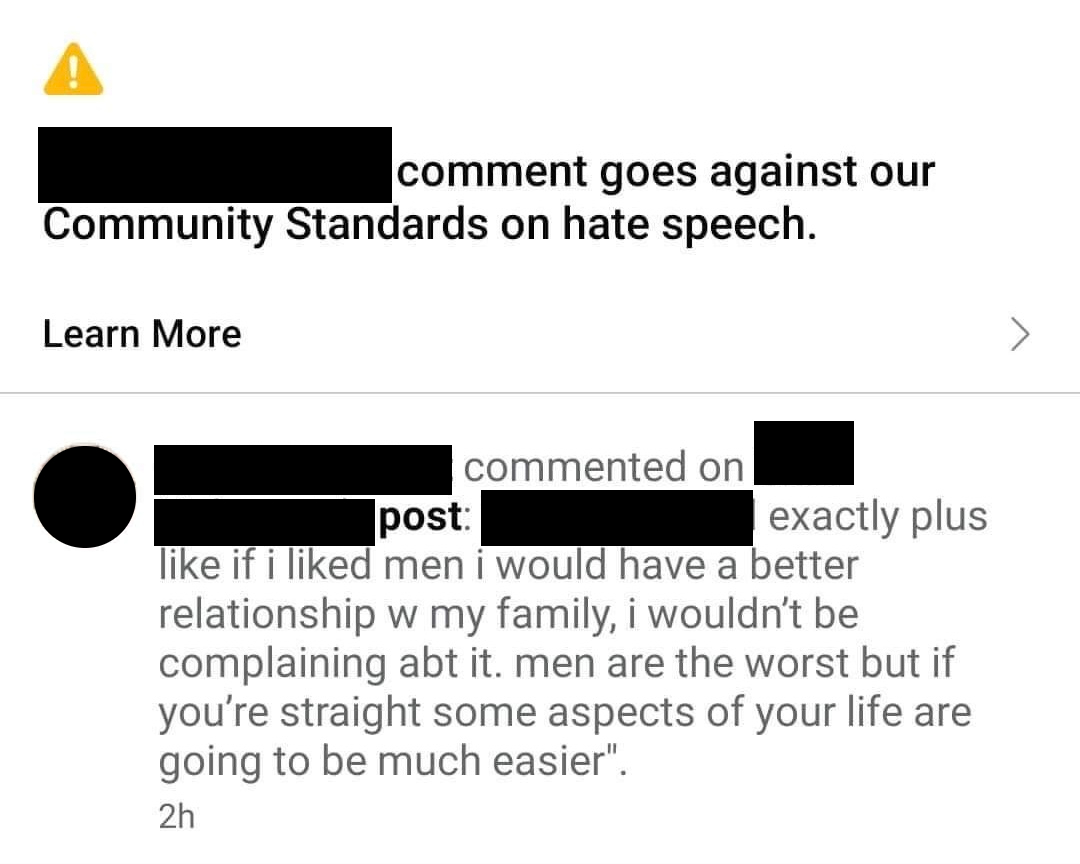
Initially, this also led to confusion among members, who thought they were being censored by the admins themselves. Most of these groups were specifically formed to filter out the gendered hate that most social media platforms have become a cesspool of, and provide vulnerable communities a safe space to rant about their experiences. It would obviously be a shocker then if they began to censor their own members.
“I would get notifications from Facebook itself saying a post or member comment has been deleted,” says Ashley Brooks*, admin of another group that calls out cisgender men’s practice of taking up space in discourse around issues that aren’t about them. “We can’t always see what it is, only sometimes. It gets very frustrating, especially when the post is not problematic at all and members get upset thinking we are the ones censoring them.”
While the censored comments and posts reported on groups like the ones Davis and Brooks run were vastly different in their content and context, one thing was in common: They all made references to men.
In the past, Facebook’s hate speech policies have raised eyebrows for banning women for using phrases like “men are trash” and “men are scum” to express their frustration, especially when the #MeToo movement first started. When these stories came to light, Facebook responded by saying, “We understand how important it is for victims of harassment to be able to share their stories and for people to express anger and opinions about harassment – we allow those discussions on Facebook. We draw the line when people attack others simply on the basis of their gender.”
However, facebookjailed.com, a website founded by comedian Kayla Avery after she was banned for using these phrases, found a double standard. While compiling stories of people being banned by the platform, it turned out that while Facebook claims to protect people being attacked for their religion, sexuality, or gender, users posting threats of lynching, violence against women, and using the copycat phrase “women are trash” have all escaped the ban. These are not isolated incidents, and Avery has coined the term “Facebook jail” to refer to the hypocritical void that women’s angry or sarcastic comments about men are exiled to, but men’s hateful remarks and outright threats of harm miraculously escape.
Another example illustrated by facebookjailed.com was when comedian Amy Shanker decided to test Facebook by writing “women are scum” and got her friends to report it. While these reports weren’t acted on by Facebook, a report by comedian Rae Sanni on a comment by another user who said “kill yourself n*” was completely ignored.
More and more people are noticing that in cases like these, the same phrase, with the use of “men” or “women” being the only variable, is treated differently by the algorithm. What Facebook has an issue seems not to be the use of words like “pigs” or “trash” or “scum”; it seems to have a problem with the use of them to refer to men. As public scrutiny around these policies increases, they seem to have only gotten stricter and more irrational, admins of groups formed specifically to protect oppressed groups’ right to vent insist.

“The phrase ‘men are trash’ has been a known target for a long time. But now it’s getting ridiculous. There was one (deleted comment) recently that literally just said ‘I dislike men’,” says Lauren Smith*, 30, also an admin of multiple such groups. She attributes some of the comments and posts being reported to organised efforts by men’s right activists, incel and red pill groups. These groups are increasingly radicalising online and perpetuating violence. Incels are misogynists who are deeply suspicious and disparaging of women and blame them for denying them their right to sexual intercourse. The Red Pill is a community on Reddit, spreading across the Internet, that was built on the belief that women have it better than men.
“They target this group and the others we run, and mass report posts. And because Facebook has been asking for ‘feedback’ for its algorithm, I guess this is the result. Anything remotely negative about men gets automatically flagged and removed by Facebook,” says Smith.
These actions by Facebook are reflective of a major debate that has gathered momentum as more people use social media to share their opinions: Is the use of phrases like “men are trash/scum” okay? The mere utterance of these phrases works as an incantation to summon hordes of disapproving men, ready to fight it out with chants of “not all men…”. And when Facebook begins classifying them as hate speech, it’s doing pretty much the same thing.
But no one really means all men when they say “men are scum”. These phrases have become akin to slogans that those wronged by men use to express anger and discomfort, which are bound to arise after the global movement detailing stories of all the messed up ways in which men use their privilege and power to assault vulnerable people. These phrases have also become a way for people to cope with traumatic experiences, and are often also used harmlessly for the purpose of humour, which is a classic coping mechanism for many.
When a woman shares a meme saying “men suck” or “all men are useless”, that’s the end of that. There’s nothing more they can do, and chances are, they’re definitely not threatening violence or harm to any specific men, unlike most men who take offence to these statements and explain in graphic detail what they’re going to do to women.
The fact of the matter is that regardless of what women say about men, it’s men who are privileged and enjoy enough power to continue to have the upper hand in society. So when Facebook classifies these phrases as hate speech, it’s ignoring these power dynamics that lie at the centre of our social systems. “That is Facebook making a decision that misogyny and racism are equal to misandry and ‘reverse-racism’ and they’re ignoring the power structure,” says comedian Marcia Belsky, who has also made it to Facebook jail many times for harmless comments.
The fear of being reported and censored for voicing their anger has resulted in men being banned from many online spaces, so as to put the spotlight on those oppressed. But many groups do allow men to join, as long as they are inclusive and open to learning different perspectives that don’t align with their opinion. One might suspect then that “bad actors” with the intent to make trouble slip through the filtering mechanisms that the groups have in place and mass report these posts, as the admins of “the bar for men…” feared initially. This could eventually lead to the group being zucced, something that group admins often have to warn members about. But over time they’ve become sure that it’s not members of the group who are reporting the posts, they mostly have the great Zucc himself to blame for this specific act of censorship.
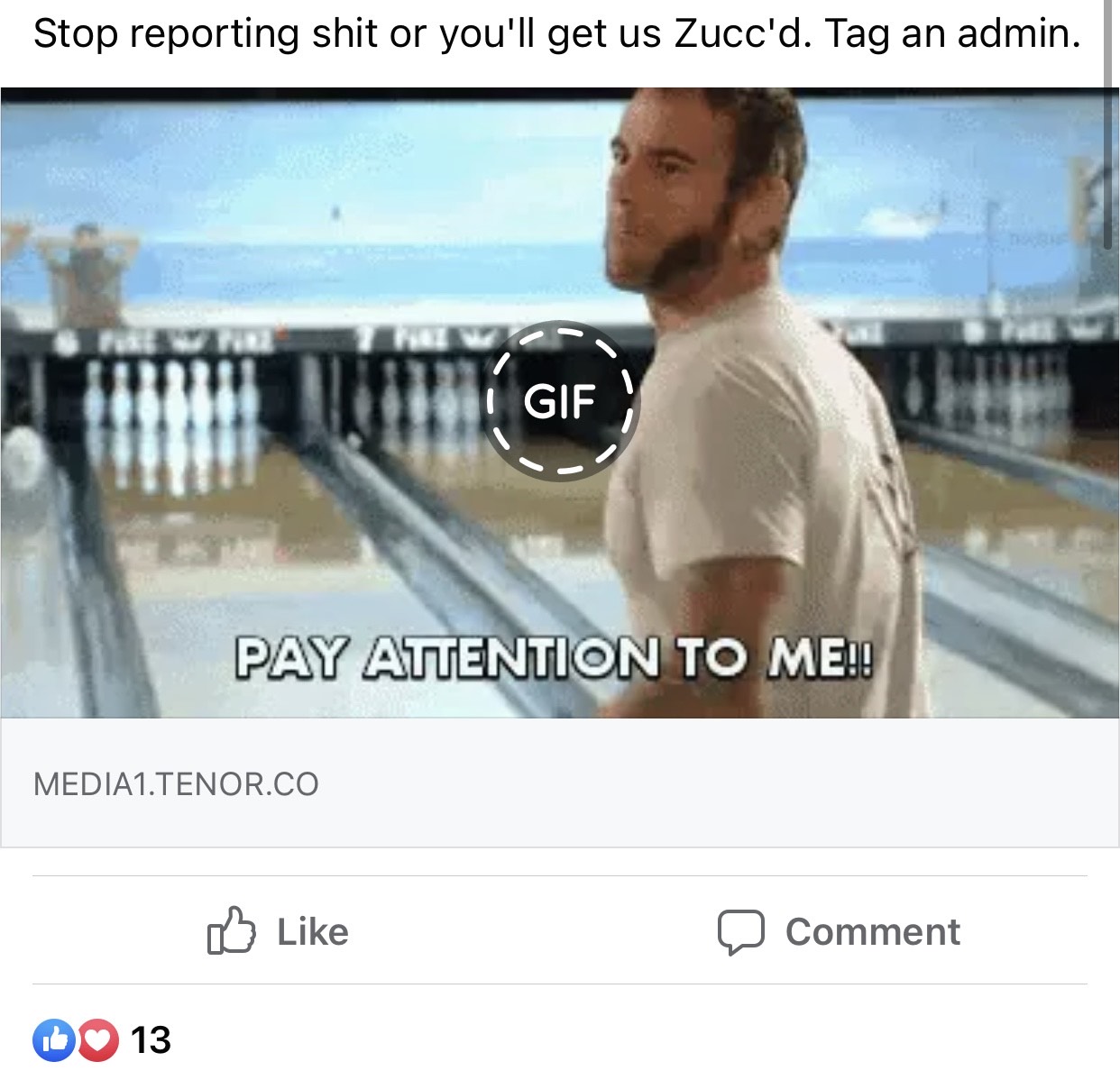
“If it was a member, we would see a notification saying ‘so and so reported a piece of content’ or ‘you have a moderator alert’,” says Smith.
So how have these groups tried to circumvent this obstacle and escape censorship that only seems to be getting progressively worse?
First, Smith’s group is trying to keep its 8,000+ members in the know about what’s going on.
“We have put out a pinned post/announcement saying that unless you receive a notification saying the group admins/moderators removed something, it was not us,” says Brooks, who’s in her mid-30s. “We do not expect people to censor themselves in a private group that we have worked so hard to cultivate and want to make sure everyone has a voice.”

Owing to these efforts to promote free expression, there is no way these groups want to stop people from discussing the issues they’ve faced with men, whom one of the admins refers to as “the trash gender”. So they’re trying to find workarounds. They’ve asked members to refer to men by calling them anything but the m-word. So it is now common for members to use “m3n”’, “ñ€m”, “m~ń”— anything that tricks the algorithm into believing there’s nothing going on there. But AI might be a step ahead already.
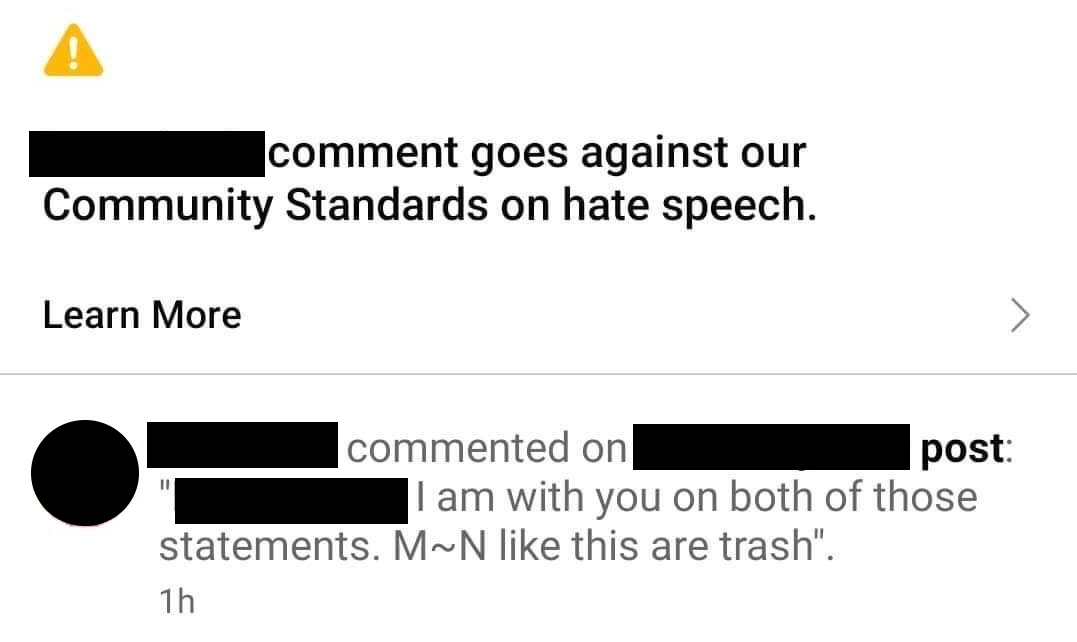
“It is hard to keep up with the algorithm as it has learned to recognise many of the common alternative spellings of ‘men’,” says Davis, whose group has over 12,000 members.
“One of the ways we work around it is our hashtags. On Mondays we allow posts that show men behaving badly, and we call it ‘men suck Monday’, but since we cannot write that out, we use the hashtag #msm,” she says, while also pointing out that many groups have even been removed because they had the word “men” in their name.
With members scattered all across the world, these groups act as a meeting place for them, and the interactions they have and the perspectives they learn here become a part of their lives beyond the Internet. And so, policies like these spark fears of a future where similar censorship and self-censorship might seep into the IRL world, making it tougher for people to talk about experiences of oppression and mistreatment.
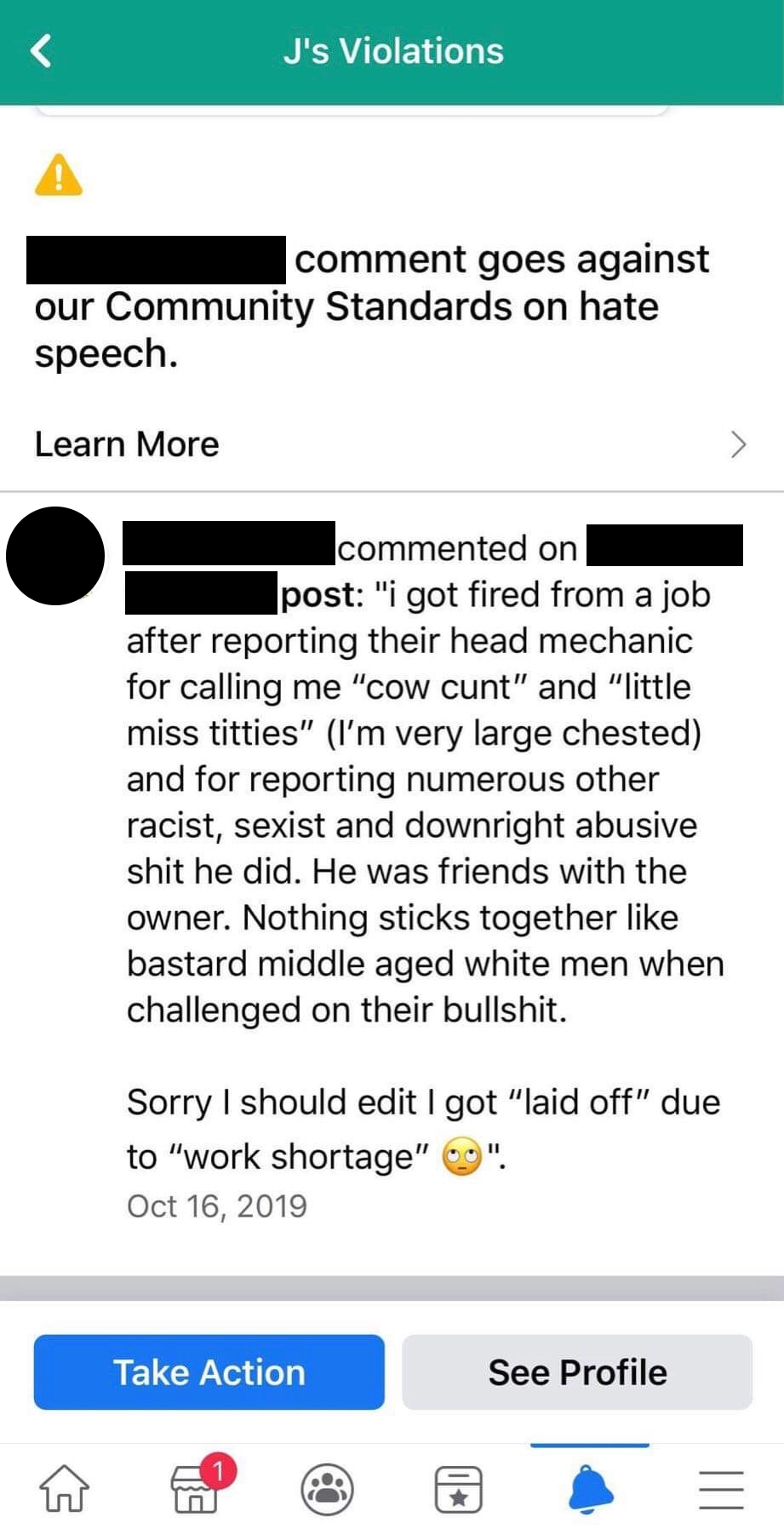
In December 2020, Facebook revealed that it has been working on overhauling its hate speech algorithms, reversing years of so-called “race-blind” policies. Under Project WoW—an effort by Facebook to better detect and delete content that it considers “the worst of the worst”— deletion of comments and posts mentioning “whites,” “men,” and “Americans” will be ranked at a lower priority than those targeting historically marginalised groups such as Muslims, the LGBTQ+ community, Blacks, and Jews. VICE tried to contact Facebook about this, but did not receive a response.
While this announcement might come as a momentary relief, it doesn’t allay the fears of group admins who spend a considerable amount of time trying to encourage opinionated discourses and addressing members’ frustration when their posts are wiped off the face of the earth.
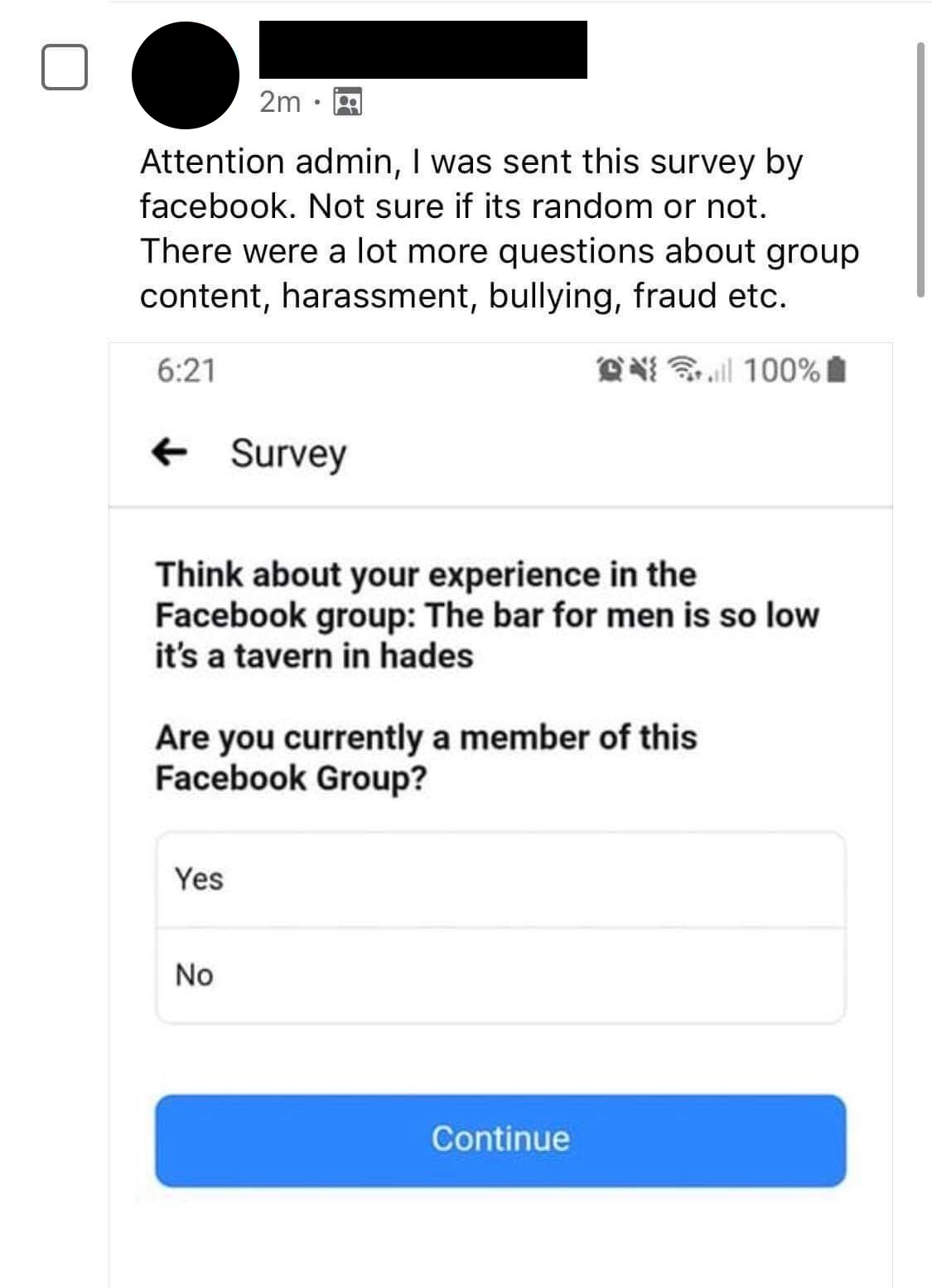
Davis says, “Seeing how many comments are deleted by Facebook, usually for no apparent reason, makes us worry that the group will be removed entirely one day. It may just be a Facebook group, but we have created a community here that many people seem to enjoy. It also points to a bigger issue of women’s voices being shut down when trying to speak up against the patriarchy.”
*Names changed to protect identity.
Follow Snigdha on Twitter.
More
From VICE
-

(Photo by Maddie Meyer/Getty Images) -

(BERTRAND GUAY/AFP via Getty Images) -

Kelly Sullivan/Getty Images


